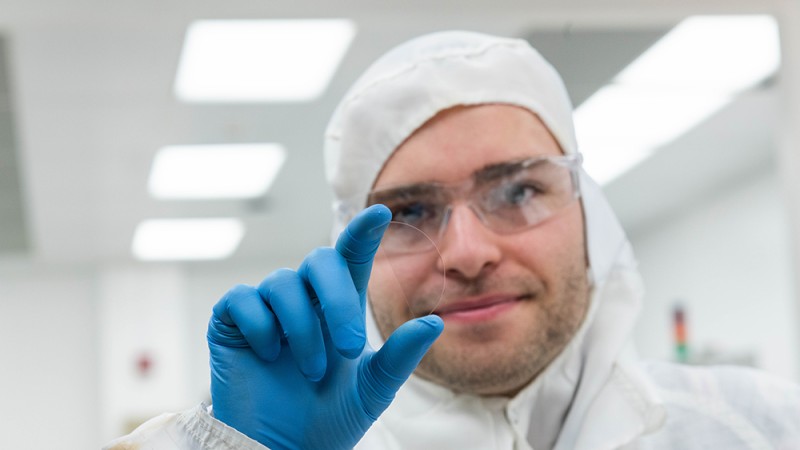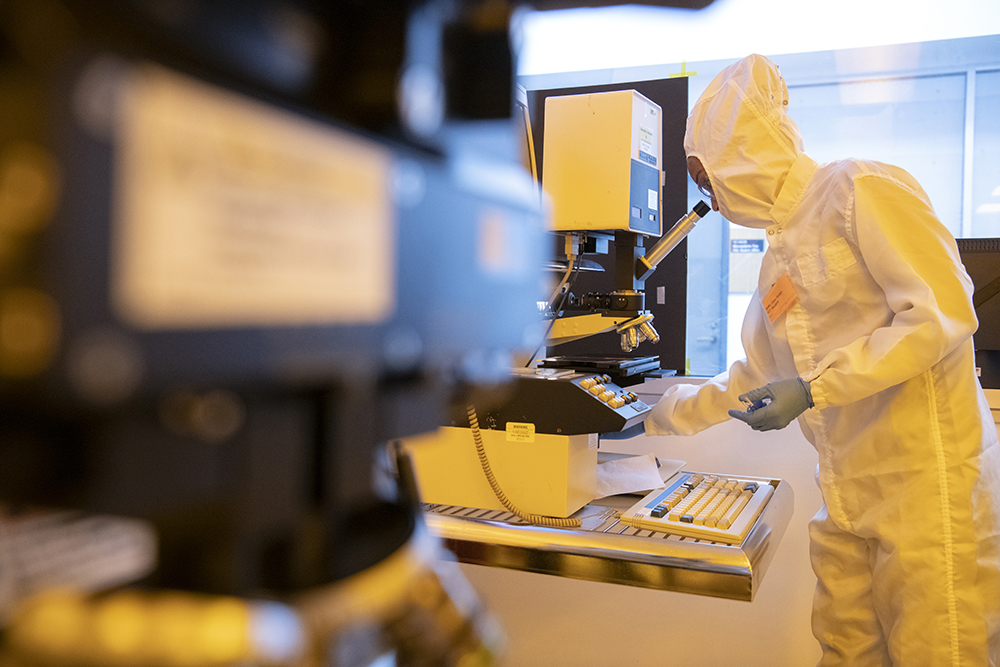Microelectronic Engineering Bachelor of Science Degree

Microelectronic Engineering
Bachelor of Science Degree
- RIT /
- Rochester Institute of Technology /
- Academics /
- Microelectronic Engineering BS
RIT’s microelectronic engineering BS program combines an EE curriculum with semiconductor courses to master the materials, processes and devices in microchips.
$84.6K
Average First-Year Salary of RIT Graduates from this degree
4
Required Co-op Blocks
2
Accelerated BS/MS Options
Overview for Microelectronic Engineering BS
Why Pursue a Microelectronic Engineering Bachelor’s Degree at RIT?
A Reputation for Excellence: RIT is a world leader in the education of semiconductor process and device engineers. Learn more about semiconductor chips at RIT.
A New Economy Major: Microelectronic engineering is one of a collection of forward-thinking degree programs that prepare you to excel in the multidisciplinary nature of our modern, dynamic economy.
Recruitment from Top Employers: RIT microelectronic engineering grads have secured dynamic positions at companies such as Onsemi, Intel, Micron, Global Foundries, Texas Instruments, Northrop Grumman, Wolfspeed, NXP, and more.
Hands-On Learning: Gain hands-on experience in the Semiconductor Nanofabrication Laboratory, RIT’s exclusive cleanroom facility with state-of-the-art process tooling that supports research and academic programs.
Accelerated Bachelor’s/Master’s Available: Earn both your bachelor’s and your master’s in less time and with a cost savings, giving you a competitive advantage in your field.
STEM-OPT Visa Eligible: The STEM Optional Practical Training (OPT) program allows full-time, on-campus international students on an F-1 student visa to stay and work in the U.S. for up to three years after graduation.
With explosive industry growth in the semiconductor industry, the time to pursue a career in microelectronics couldn’t be better.
Semiconductors (also known as microchips, computer chips, or integrated circuits) are the engine behind nearly every digital device and electronic instrument in use today. They are embedded into everything from game consoles, automobiles, and aviation to data science, advanced computing technologies, and so much more. The growing adoption of emerging technologies like artificial intelligence, quantum computing, and 5G wireless communication is driving the demand for advanced semiconductor products.
Supply chain disruptions and a strong demand for consumer electronics during the pandemic have led to a global computer chip shortage. The shortage has highlighted the need to strengthen the domestic semiconductor industry and has put new emphasis on microelectronic engineering education.
Thanks to the 2022 CHIPS and Science Act, semiconductor companies are receiving billions of federal funding to keep the U.S. at the forefront of the microchip industry. Engineers who understand the manufacturing processes involved with microchip fabrication are in high demand by companies such as Intel, Samsung, Micron, TSMC, and Texas Instruments. Companies fabricating chip designs with the most advanced nanoelectronic device technology will be hiring thousands of engineers to support their operations. Job opportunities for microelectronic engineers continue to grow and are projected to reach unprecedented numbers.
RIT's Microelectronic Engineering Degree
RIT is a recognized world leader in the education of semiconductor process engineers. Our microelectronic engineering degree offers you an unparalleled opportunity to prepare for professional challenges and success in this leading, high-growth area of engineering.
Electrical and computer engineering programs focus on the design of microchips, which includes all the details of the circuits and subsystems that store data (memory) and perform logic operations (CPU) which define the chip operation. RIT’s microelectronic engineering program concentrates on the materials, processes, and devices involved with the fabrication of microchips. This focus prepares you for high-demand jobs involving the building and testing of electronic devices. The degree combines a solid foundation in electrical engineering, with additional courses in chemistry, physics, materials science, optics and imaging that are not found in traditional programs.
Microelectronic Engineering Curriculum
RIT’s microelectronic engineering degree is a five-year program that includes courses in electrical engineering, semiconductor processes and devices, and microchip manufacturing, and nearly a year of hands-on cooperative education experience.
- Year 1: Your curriculum begins with introductory courses in microelectronic engineering, with an overview of the patterning and fabrication processes used to make microchips. You will build a solid foundation in mathematics, physics, and chemistry, and courses will cover important issues such as technology development, ethics, societal impact, and global perspectives.
- Year 2: This year covers the fundamentals of statistics and design of experiments, semiconductor device physics, and integrated circuit technology, where students design, fabricate, and test their own devices within a class microchip.
- Year 3: This year comprises the electrical engineering coursework in circuits, electronics, and digital systems, in addition to lab-based courses in process and device simulation and computer-aided design (CAD).
- Year 4 and 5: These two years are dedicated to semiconductor materials and processes, optics and nanolithographic imaging, professional electives, and a two-course capstone senior project.
Throughout the curriculum, you will complete four blocks of cooperative education which alternates classroom learning with full-time, paid work experience in the semiconductor industry. This provides you with career experience, advanced learning opportunities, and industry contacts that result in job offers after graduation.
Professional Electives
A choice of professional electives enables you to customize your coursework around areas of interest or gain a deeper understanding of a particular subject within microelectronic engineering. Professional electives include courses in the areas such as:
- Advanced Semiconductor Devices
- Digital IC Chip Design
- Analog Circuit Design
- Microelectromechanical Systems (MEMS)
- Machine Learning and Artificial Intelligence
- Nanomaterials Characterization
- Lasers and Integrated Photonics
Hands-On Experience in Microelectronic Engineering
Senior Capstone Project:
In the capstone course, you’ll propose and conduct individual research/design projects and present your work at the Annual Microelectronic Engineering Conference, organized by the Department of Electrical and Microelectronic Engineering and well-attended by industrial representatives.
Modern, Hands-On Labs
RIT's undergraduate microelectronics engineering laboratories, which include modern integrated circuit fabrication (clean room) and test facilities, are among the best in the nation. In these state-of-the-art facilities, you will gain hands-on experience from day one designing, fabricating, and testing integrated circuits (microchips). These labs include:
- Semiconductor Nanofabrication Laboratory (SNL)
- Electrical Test and Characterization Laboratory
- Electrical Engineering Studio Labs (Design and Build)
- ICE and VLSI Chip Design Labs
The labs at RIT provide a complete in-house design, fabrication, and testing capability. The ICE and VLSI chip design labs have advanced software suites from Cadence and Synopsys, providing students with the same design tools they use in the industry. The RIT Semiconductor Nanofabrication Lab (SNL) is a class 1000 cleanroom facility with a complete equipment set for the fabrication of semiconductor devices on 150 mm silicon wafers (CMOS and MEMS) as well as compound semiconductor materials such as gallium arsenide and indium phosphide for lasers, LEDs, and advanced photovoltaics. Wafer-probers and parameter analyzers are used to test and characterize device operation, verifying function and performance.
Having all of these resources available is a critical need for our research programs and supports a quality hands-on laboratory learning experience for our students. While university cleanrooms are typically reserved strictly for research, the RIT SNL is the instructional lab for RIT’s undergraduate and graduate programs in microelectronic engineering, microsystems, and related disciplines. Not only does the SNL serve as a teaching and research lab, but it is also a prototyping facility for corporate partners and a resource for multiple levels of workforce development training. Infrastructure and tooling upgrades in the SNL are in progress to support growing research programs in nano-bio devices and sensors and integrated quantum photonic devices. In combination with artificial intelligence, these technologies will enable advances in smart systems for healthcare, transportation, manufacturing, defense, and security, among others.
Microelectronic Engineering vs. Electrical Engineering: What's the Difference?
What is Microelectronic Engineering?
Microelectronic engineering is a subfield of electrical engineering with a focus on semiconductor materials, processes, and devices. While it is specialized, it is a multidisciplinary program that combines a strong foundation in circuits and electronics with scientific disciplines such as chemistry, physics, materials science, optics, and imaging that enable the fabrication of microchips. This unique combination is found only at RIT in the nation’s only ABET-accredited program in microelectronic engineering. Microchips are the engine behind every electrical engineering discipline and play a pivotal role in driving innovation across diverse industries. Applications span many sectors, including consumer electronics, telecommunications, automotive, aerospace, energy, healthcare, and industrial automation. To excel in this field, individuals need to possess specialized skills in semiconductor physics, integrated circuit design, design of experiments, fabrication processes, and device modeling.
What is Electrical Engineering?
Electrical engineering encompasses a broad spectrum of disciplines involving the study, design, and application of equipment, devices, and systems that use electricity, magnetism, and electromagnetism. This expansive field covers various topics such as Analog and Mixed-Signal Electronics, Electronic Devices and Components, Digital and Computer Systems, Electromagnetics and Waves, Mechatronics, Electrical Power Systems, Telecommunications, Signal Processing, Machine Learning, Artificial Intelligence, Robotics, Integrated Photonics, and last but certainly not least, Semiconductors and Microelectronics. As a result, electrical engineers work in a wide variety of industries and are required to possess skills in circuit design, system architecture, algorithm development, and project management. Electrical engineers intensively use computer-aided design tools, coding, and instrumentation for the building and testing of circuits and systems.
Furthering Your Education in Microelectronic Engineering
Combined Accelerated Bachelor’s/Master’s Degrees
Today’s careers require advanced degrees grounded in real-world experience. RIT’s Combined Accelerated Bachelor’s/Master’s Degrees enable you to earn both a bachelor’s and a master’s degree in as little as five years of study, all while gaining the valuable hands-on experience that comes from co-ops, internships, research, study abroad, and more.
- Microelectronic Engineering BS/Electrical Engineering MS
- Expand your learning experience and perform leading-edge research in complementary technology areas such as analog/digital IC design, computer system design, and the design of micro-electromechanical systems.
- Microelectronic Engineering BS/Industrial and Systems Engineering MS
- Focus on the design of efficient production systems that optimize the use of resources, resulting in reduced waste, system sustainability, high manufacturing yield, and maximum profit.
- Microelectronic Engineering BS/Materials Science and Engineering MS
- Broaden your knowledge of materials and material characterization techniques, which are critical in semiconductor device fabrication and manufacturing processes.
- Microelectronic Engineering BS/Science, Technology, and Public Policy MS:
- Become prepared for roles in shaping public policy surrounding the development of new technologies to ensure ethical, environmental, and societal responsibilities and an improved quality of life.
- +1 MBA: Students who enroll in a qualifying undergraduate degree have the opportunity to add an MBA to their bachelor’s degree after their first year of study, depending on their program. Learn how the +1 MBA can accelerate your learning and position you for success
What Can I Do with a Career in Microelectronic Engineering?
A degree in microelectronic engineering opens up a wide range of career opportunities in various industries, especially in technology, electronics, and engineering. Some potential career paths you could pursue include:
- Integrated Circuit (IC) Design Engineer: Designing and developing microchips and integrated circuits for various applications such as computer processors, memory chips, and sensors.
- Embedded Systems Engineer: Working on the design, development, and testing of embedded systems for applications like consumer electronics, automotive systems, medical devices, and industrial control systems.
- Analog or Digital Circuit Design Engineer: Specializing in designing analog or digital circuits for specific applications such as signal processing, power management, or communication systems.
- Semiconductor Process Engineer: Working on the fabrication processes of semiconductor devices, ensuring the efficiency, reliability, and quality of semiconductor manufacturing processes.
- Semiconductor Device Engineer: Overcome the limitations of miniaturization by implementing new solutions in materials and device structures for continuous improvements in packing density, switching speed, and power consumption.
- Microelectromechanical Systems (MEMS) Engineer: Designing and developing miniature mechanical and electrical devices, such as sensors and actuators, for various applications, including biomedical devices, consumer electronics, and automotive systems.
- Product Development Engineer: Developing new electronic products by integrating microelectronics components into innovative designs, overseeing the entire product development lifecycle from concept to production.
- Research and Development (R&D) Engineer: Conducting research to explore new technologies, materials, and techniques for improving microelectronics devices and systems.
- Quality Assurance Engineer: Ensuring the quality and reliability of microelectronics products through testing, analysis, and optimization of manufacturing processes.
- Technical Sales Engineer: Providing technical expertise and support to customers, marketing teams, and sales personnel for microelectronics products and solutions.
- Academic or Research Scientist: Pursuing advanced studies and research in microelectronics, contributing to advancements in the field through academic research, teaching, and publications.
-
#57 Best Engineering Undergraduate Programs, 2026
RIT’s engineering majors are ranked among the Best Undergraduate Engineering Programs in the nation.
-
Join Us for Accepted Student Open House
Visit campus on March 28 or April 11 to meet faculty, tour campus, and ask your questions.
-
Join us for Fall 2026
There's still time to apply. For some programs, applications will be reviewed on a rolling, space-available basis.
Careers and Cooperative Education
Typical Job Titles
| Semiconductor Engineer | Development Engineer | Equipment Engineer |
| Manufacturing Yield Engineer | Process Engineer | Research Engineer |
| Device Engineer | Field Applications Engineer | Photolithography Engineer |
| Process Integration Engineer |
Industries
-
Electronic and Computer Hardware
-
Manufacturing
Cooperative Education
What’s different about an RIT education? It’s the career experience you gain by completing cooperative education and internships with top companies in every single industry. You’ll earn more than a degree. You’ll gain real-world career experience that sets you apart. It’s exposure–early and often–to a variety of professional work environments, career paths, and industries.
Co-ops and internships take your knowledge and turn it into know-how. Your engineering co-ops will provide hands-on experience that enables you to apply your engineering knowledge in professional settings while you make valuable connections between classwork and real-world applications.
Students in the microelectronic engineering degree are required to complete four blocks (48 weeks) of cooperative education. Co-ops may begin after the second year of study. Students find co-op employment in the semiconductor and nanofabrication industries, and in areas such as nanotechnology, microelectromechanical systems, photonics, photovoltaics, and microsystems. Students complete co-ops at some of the world’s leading electronics companies, including Intel, Samsung, Texas Instruments, and Motorola.
Featured Work and Profiles
-
Engineering Alumnus Influences National Semiconductor Research Initiatives
Scott Bukofsky '92 brings extensive experience to the U.S. Department of Commerce’s National Semiconductor Technology Center.
Read More about Engineering Alumnus Influences National Semiconductor Research Initiatives -
Alumna Harshala Patil leads semiconductor development at Samsung
Alumna Harshala Patil ’15 (electrical and microelectronic engineering) is leading semiconductor development and manufacturing initiatives at Samsung Austin, one of the top three global computer chip...
Read More about Alumna Harshala Patil leads semiconductor development at Samsung -
RIT Research Minute: Photonic Microchips
Stefan Preble Professor Stefan Preble and his research team are developing the next generation of photonic chips to improve fields like quantum computing and health care.
Read More about RIT Research Minute: Photonic Microchips -
From Classroom to Career: Elissa Sainthil's Transformative Co-op Experience at Advanced Energy
Elissa Sainthil gained valuable experience during her co-op at Advanced Energy where she worked on UltraVolt products.
Read More about From Classroom to Career: Elissa Sainthil's Transformative Co-op Experience at Advanced Energy -
Microelectronic Engineering Alumni Shaping the Future in Diverse Industries
RIT's microelectronic engineering graduates are making significant advancements in various fields, from LED display technology and sensor systems to NASA's Mars missions, showcasing the impact of...
Read More about Microelectronic Engineering Alumni Shaping the Future in Diverse Industries -
RIT Alumnus Drives Innovation with Breakthrough Micro-LED Display Startup
Matthew Hartensveld, RIT alumnus and co-founder of Innovation Semiconductor, is pushing the boundaries of display technology with his pioneering work on micro-LED platforms.
Read More about RIT Alumnus Drives Innovation with Breakthrough Micro-LED Display Startup
Curriculum for 2025-2026 for Microelectronic Engineering BS
Current Students: See Curriculum Requirements
Admissions and Financial Aid
This program is STEM designated when studying on campus and full time.
First-Year Admission
First-year applicants are expected to demonstrate a strong academic background that includes:
- 4 years of English
- 3 years of social studies and/or history
- 4 years of math is required and must include algebra, geometry, algebra 2/trigonometry, and pre-calculus. Calculus is preferred.
- 2-3 years of science. Chemistry and physics are required.
Transfer Admission
Transfer applicants should meet these minimum degree-specific requirements:
- A minimum of pre-calculus is required. Calculus is preferred.
- Chemistry and physics is required.
Financial Aid and Scholarships
100% of all incoming first-year and transfer students receive aid.
RIT’s personalized and comprehensive financial aid program includes scholarships, grants, loans, and campus employment programs. When all these are put to work, your actual cost may be much lower than the published estimated cost of attendance.
Learn more about financial aid and scholarships
Accreditation
Research
Please visit the research profiles on the electrical and microelectronic engineering department for an overview of research opportunities. Visit individual faculty profiles for a more complete list of research advisors in the program.
Related News
-
December 19, 2025

University launches multidisciplinary training program to strengthen the U.S. semiconductor workforce
RIT has launched CMOS+X, a National Science Foundation Research Traineeship program that prepares future STEM leaders with professional skills training, including interdisciplinary collaboration, scientific writing, strategic communication, and project management skills.
-
December 1, 2025

Study details how analog computing solves signal processing challenges faster
Researchers at RIT have improved the electronics used in communication and radar systems to better process signals using electromagnetic radio waves. This breakthrough could advance computing processes for technologies that need to handle signals quickly and efficiently.
-
November 24, 2025
BOCES students get hands-on experience at RIT labs
High school students from the New Visions Engineering program at Greater Southern Tier BOCES visited RIT for an immersive, hands-on experience in cutting-edge engineering labs.
Contact
- Karl Hirschman
- Director of Microelectronic Engineering
- Department of Electrical and Microelectronic Engineering
- Kate Gleason College of Engineering
- 585‑475‑5130
- kdhemc@rit.edu
Department of Electrical and Microelectronic Engineering
























